 "We're on the verge of something so ugly": Quatermass II
"We're on the verge of something so ugly": Quatermass II
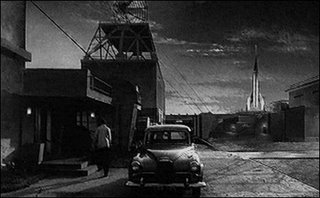 It is fifty years ago or so, in a place not so alien… In the greens and browns of the countryside, New Towns of tile, concrete and rational planning spring up. Roads arrive metre by metre to join them. Places of work, factories and refineries grow and evolve like intricate corals between. A government still wary of the people that it works to protect plans and plots for the worst of all worlds. Wary people keep quiet; blowing the whistle will destroy a chance of a comfortable life for them and their families. A man tries to turn the tide of history, aware that his vision of the future, clean and bright, is slipping away, consumed by the squalor of plans for war and national hubris…
It is fifty years ago or so, in a place not so alien… In the greens and browns of the countryside, New Towns of tile, concrete and rational planning spring up. Roads arrive metre by metre to join them. Places of work, factories and refineries grow and evolve like intricate corals between. A government still wary of the people that it works to protect plans and plots for the worst of all worlds. Wary people keep quiet; blowing the whistle will destroy a chance of a comfortable life for them and their families. A man tries to turn the tide of history, aware that his vision of the future, clean and bright, is slipping away, consumed by the squalor of plans for war and national hubris… Quatermass II, the second film Quatermass film produced by Hammer, is often held up as a kind of British answer to American films such as ‘Invasion of The Bodysnatchers’. While there are similarities, with people being controlled or replaced by a malevolent alien force, there are also significant and interesting differences.
Often coming off a critical third when compared to the two Quatermass films that bookend it, Quatermass II is generally seen to lack the imagination of its siblings, producing a hackneyed exploration of themes treated far more excitingly in US films of the period. What this analysis misses is the very thing that gives Quartermass II its particlular power. The film is imbued with very a particular sense of British unease, and is, in fact, extremely responsive to the domestic concerns and unease of a nation nearly a decade out of the War but still in many ways living with it.
Quatermass returns, played again by famously thirsty American actor Brian Donlevy, this time in a far more precarious position than when we last saw him in The Quatermass Xperiment. The future of his British Rocket Group is hanging in the balance, a grand plan to colonise the moon passed over for funding. Still a hard headed driving force, eyes locked upon achieving his aims, we now see Quatermass as others see him: A grumpy man with big ideas, pacing the corridors of his own scientific fiefdom, his life rotating around the aerodynamic rocket that pokes into the overcast sky above his experimental research establishment.
Travelling back from another meeting with the people from the ministries, Quatermass runs into a couple in trouble, beginning about a chain of events which climax in the ending of an insidious alien threat and a perversion of his beloved rocket, the Quatermass II, which like the predecessor we saw in our previous meeting with him, brings destruction rather than scientific hope. He can’t even manage to be civil to his own staff, complaining that they are wasting valuable time tracking a succession of meteorites that entering the atmosphere with precise regularity.
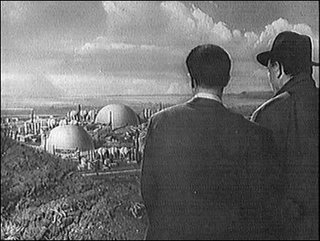 Investigating the claims of the young couple, Quatermass travels into the green emptiness of the English countryside, travelling up a new road that quite literally ends under his feet in a mess of government property signs and distant chainlink fences. Tracking back, he finds the remains of a village, Winnerden Flats; he also finds a huge copy of his moon base, all domes and pipes, sitting seemingly undiscovered amongst the hills. His colleague, uncovering one of the meteorites we’ve seen being tracked, is struck down by what Quatermass describes as ‘a big black bubble’ shooting from it. Uniformed and armed guards arrive, complete with breathing apparatus, bundling Quatermass’s colleague into a car and sending Quatermass on his way.
Investigating the claims of the young couple, Quatermass travels into the green emptiness of the English countryside, travelling up a new road that quite literally ends under his feet in a mess of government property signs and distant chainlink fences. Tracking back, he finds the remains of a village, Winnerden Flats; he also finds a huge copy of his moon base, all domes and pipes, sitting seemingly undiscovered amongst the hills. His colleague, uncovering one of the meteorites we’ve seen being tracked, is struck down by what Quatermass describes as ‘a big black bubble’ shooting from it. Uniformed and armed guards arrive, complete with breathing apparatus, bundling Quatermass’s colleague into a car and sending Quatermass on his way.Nearby, Quatermass finds a New Town in the early stages of construction. Housing for the workers at the plant, it is still in the process of coming into being and carving its existence into the countryside. It has wide, planned but unfinished streets that end in empty fields and a general air of desolation.
The community centre, the only bit of the town with any sign of activity, is plastered with posters extolling the necessity of secrecy. Trying to ring for help, Quatermass is stopped by a community leader who tells him directly not to stir up trouble. The plant produces synthetic food, no more, no less.
Travelling back to London, Quatermass is put in touch with MP Vincent Broadhead, implicitly Labour, who is as unconvinced as Quatermass that the production of synthetic food is what is actually going on at Winnerden Flats. Broadhead has been campaigning and asking questions, mainly about the huge amounts of public money being channel into the project and, having finally arranged an official site visit, invites Quatermass to accompany him.
Once there, Quatermass, Broadhead and other visitors are guided around the sprawling plant, all tangles of huge pipes, domes and gasholders, empty and exposed. Quatermass manages to sneak off, finding an empty infirmary and no sign of his associate. Their guide is most forceful that they remain with the group, as they have a schedule to keep.
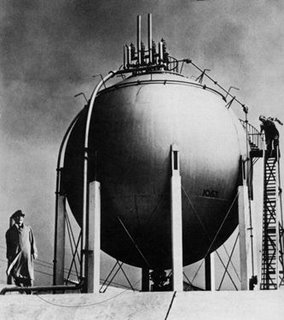 Broadhead manages to slip away, and it becomes clear to Quatermass that there is some sort of unpleasant fate awaiting him. The guide’s brittle efficiency soon evaporates as Quatermass manages to escape, only to find Broadhead screaming covered in horrid black ooze, slumping to his death amongst the steel and concrete. Under fire, Quatermass manages to escape and make it back to London, taking his experiences to his old friend Inspector Lomax.
Broadhead manages to slip away, and it becomes clear to Quatermass that there is some sort of unpleasant fate awaiting him. The guide’s brittle efficiency soon evaporates as Quatermass manages to escape, only to find Broadhead screaming covered in horrid black ooze, slumping to his death amongst the steel and concrete. Under fire, Quatermass manages to escape and make it back to London, taking his experiences to his old friend Inspector Lomax.Despite what Quatermass saw, the newspaper shows Broadhead to be alive and well. Lomax, hoping to ask his superior for advice notices a tell-tale mark on his hand, one not dissimilar to the marks that Quatermass has described on those who have been exposed to the meteors… Picking up a drunken yet sharp reporter played by Sid James, a long way from Carry On and all the better for it, Quatermass and Lomax set out to get to the bottom of what seems to be no less than a silent, careful invasion, where figures of authority are being controlled from afar…
Giving a commentary on the current DVD edition of Quatermass II but nowhere credited on the disc itself as doing so, Nigel Kneale, who handled the adaptation of his script from the television series he had written the previous year for the BBC, says that in the 1950s, there were plenty of things to be afraid of. He talks about a country that was secret prone, where too much was taken for granted. All over, actual research projects and military sites were being created at the same time as New Towns were being built. It is the Hemel Hempstead New Town Development Corporation that is acknowledged in the opening credits, alongside the Shell Haven Refinery, for providing the settings for events. Rather than being set in an imagined landscape of secrecy and change, Quatermass is actually set in a real landscape minded for its maximum discomfort. He talks of consciously setting the events in “the new British scene of the 1950s”, of how it was "easy to imagine anything at that time” with the “guarded, secretive announcements of the War Department” where “no-one knew who was responsible for what” and where “people took a great deal more on trust than they should have”. As we have seen, the UK really was a place where rockets took off and where huge structures did spring up guarded by secrecy.
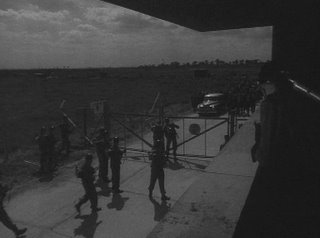 Britain as portrayed in Quatermass II is a threatening, dark place full of dislocations and only partially perceived threats. Shot under overcast skies and in squally winds, even the familiar green and pleasant lands have a sense of menace and bleak emptiness, as if the pastoral celebrations of Powell and Pressberger and the little people in triumph of Ealing that so informed Britain’s image of itself during the war years had turned sour in the mouth of post war realities.
Britain as portrayed in Quatermass II is a threatening, dark place full of dislocations and only partially perceived threats. Shot under overcast skies and in squally winds, even the familiar green and pleasant lands have a sense of menace and bleak emptiness, as if the pastoral celebrations of Powell and Pressberger and the little people in triumph of Ealing that so informed Britain’s image of itself during the war years had turned sour in the mouth of post war realities.The film has a particularly British sense of localism, displaying a pre-flight and pre-mass car ownership understanding of landscape. Advances in popular mechanical modes of transport, as well as ever proliferating media outlets, mean that we have progressively collapsed space and time, folding together geographically distant points until we feel that we know intimately everything about the UK. We can hold an image of what we think the UK is in our minds, so used are we to moving almost instantly from place to place, town to town, eating up the landscape and carrying it in our heads as an illusion of a totality. In Quatermass II, the landscape is unknown, unknowable. It is possible to go slightly off the usual path and find a whole huge development, unknown to the world at large. New towns are springing up, their inhabitants as distant from London as settlers on a distant island. When Quatermass asks the way to the police station in Winnerden Flats, he is told they don’t have one, the implication being not that this new town is so peaceful and well ordered that it doesn’t need one, but that it is like a frontier town, pushing beyond the reach of the law. When Quatermass finds the site of the alien project, his colleague remarks, “Maybe we’ve struck a rival project”, as if it were to be expected that the countryside would be littered with top-secret establishments. Scenes of uniformed, gasmasked troops spreading out across fields like a virus, occupying the unfamiliar terrain, heighten this sense of the unknown regarding one’s own county.
There is a sense of fading idealism in Quatermass and his Rocket Group that very much mirrors the feelings of engineers who worked on the real British Space Programme. (See this previous post for more details) Relaying the results of his meeting in London to his staff, Quatermass says:
“No more money… To date you’ve spent a lot of money on a rocket that isn’t even safe to launch. At the moment we have projects of far more importance. Isn’t it important enough to be the first to build a colony on the moon? To get men there against the odds?”
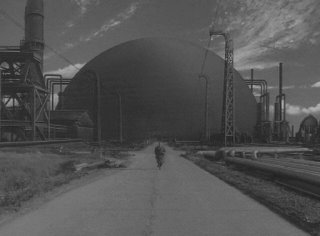 While it may be inferred from the plot that the project of more importance is the alien bridgehead at Winnerden Flats, there is a much stronger indication that it is the military application of Quatermass’s work which is of interest, a point underlined by the use of his rocket as a bomb to destroy the alien base and the huge, dirty and unpleasant creatures that emanate from it at the films climax. The film seems concerned with this inversion, with the sullying of science by its association with The Bomb. As Nigel Kneale says: “There was a lot of cheap joy when the British H Bomb exploded… It was not healthy that people should rejoice such a thing”. Quatermass is concerned that his work should be put toward constructive, not destructive purposes, but the plot systematically turns this wish on its head. His rocket, the Quatermass II of the title, doesn’t bring life to other worlds; it destroys life on this planet. His moon base design doesn’t protect humanity from the hostile elements; it encloses hostile elements to nurture a hostile form of life. Even this form of life represents ‘getting your hands dirty’, comprising as it does of a huge liquid thing resembling nothing more than a kind of caustic manure, leaving a black, stinking trail behind it. The plant itself is said to produce food but in fact produces the opposite, materials that kill rather than sustain life. There are two wonderful shots in the film of a huge dome, with the party of visitors walking towards it, followed later by Quatermass running away from it alone. Standing as it does on a flat horizon, the dome looks like nothing less than a huge black sun, taking in light and life rather than giving it out.
While it may be inferred from the plot that the project of more importance is the alien bridgehead at Winnerden Flats, there is a much stronger indication that it is the military application of Quatermass’s work which is of interest, a point underlined by the use of his rocket as a bomb to destroy the alien base and the huge, dirty and unpleasant creatures that emanate from it at the films climax. The film seems concerned with this inversion, with the sullying of science by its association with The Bomb. As Nigel Kneale says: “There was a lot of cheap joy when the British H Bomb exploded… It was not healthy that people should rejoice such a thing”. Quatermass is concerned that his work should be put toward constructive, not destructive purposes, but the plot systematically turns this wish on its head. His rocket, the Quatermass II of the title, doesn’t bring life to other worlds; it destroys life on this planet. His moon base design doesn’t protect humanity from the hostile elements; it encloses hostile elements to nurture a hostile form of life. Even this form of life represents ‘getting your hands dirty’, comprising as it does of a huge liquid thing resembling nothing more than a kind of caustic manure, leaving a black, stinking trail behind it. The plant itself is said to produce food but in fact produces the opposite, materials that kill rather than sustain life. There are two wonderful shots in the film of a huge dome, with the party of visitors walking towards it, followed later by Quatermass running away from it alone. Standing as it does on a flat horizon, the dome looks like nothing less than a huge black sun, taking in light and life rather than giving it out.In a wonderful shot of the New Town earlier on in the film, a street of houses, empty but for a mother pushing a pram, simply ends in fields. This sense of artificiality is another factor of the film that may not travel well. The people of Winnerden Flats New Town are dependent on the Refinery for work, marooned as they are. The scene where all ages are having a dance or function at the community centre, with drinks served by a brassy young lady from behind a makeshift bar, is at once a perfect expression of the dreams of town planners and a throwback to the frontier towns we are used to seeing in Westerns. They have no choice but to be complicit in the goings on at the Refinery, only rebelling and marching upon it when the actions of Quatermass and his colleagues bring about a brutal repression. The worry about artificiality versus organic growth in communities is a British preoccupation; with town planning being both demonised and lionised depending upon circumstance. The suggestion that the relocation of people to newly created places may introduce them to new pressures and problems may seem obvious now, but at the time of the films production the first wave of post war New Towns was in full swing. It would eventually result in the construction of twenty-nine 'New Towns'. Twenty-three towns in England and Wales and six in Scotland, Stevenage being the first. (See this previous post for more on New Towns)
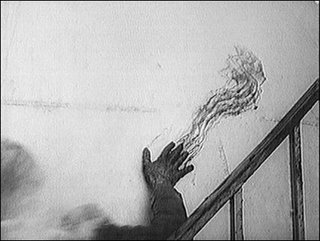 Quatermass II has a sense of unease in the future that can only be experience by engaging with the present, which it shares with many British New Wave films that followed it. It also suggests that there are more problems in Britain than can be solved by the final destruction of the Refinery at the films climax. While it was possible to vanquish the alien foe, the conditions of the country continue beyond the titles. There is a sense that, while there were extenuating circumstances, the way in which Britain functions made it ripe for an invasion of the sort detailed in the film, with secretive governments and deferential workers conspiring to allow unspeakable things to happen. At one point Quatermass, in despair, exclaims: "We're on the verge of something so ugly."
Quatermass II has a sense of unease in the future that can only be experience by engaging with the present, which it shares with many British New Wave films that followed it. It also suggests that there are more problems in Britain than can be solved by the final destruction of the Refinery at the films climax. While it was possible to vanquish the alien foe, the conditions of the country continue beyond the titles. There is a sense that, while there were extenuating circumstances, the way in which Britain functions made it ripe for an invasion of the sort detailed in the film, with secretive governments and deferential workers conspiring to allow unspeakable things to happen. At one point Quatermass, in despair, exclaims: "We're on the verge of something so ugly."In many ways, Quatermass II is the most British of the three Quatermass films, depending as it does on topical, domestic developments for its sense of uneasiness. In a genre widely considered American both in parentage and in practice, Quatermass II unsurprisingly fails to push the right buttons for some audiences.
Archeology of the Future, on the other hand, thinks it’s a bleak, British wonder.
In a strange piece of life imitating art, the climax of Quatermass II had an almost exact mirror in real life when Hemel Hempstead was the scene of the biggest fire in Europe since World War II when Buncefield oil depot exploded. The BBC reported the initial explosion like this:
http://news.bbc.co.uk/1/hi/uk/4519382.stm
This site includes some amazing pictures of the huge plumes of smoke and the devastation caused:
http://www.buncefield-oil-fire-hemel-hempstead.wingedfeet.co.uk/
Suddenly, the world doesn’t seem so predictable or cosy…
Buy Quatermass II from amazon.co.uk here
Technorati Tags: science fiction, Quatermass, british science fiction, post war britain, Nigel Kneale, 1950s






2 Comments:
Wonderful post, Archaeology. Flat out wonderful.
5:27 pm, May 10, 2006
One day the world will gasp in awe of the metaphysical thriller set in a New Town that's been gestating in my head ever since I managed to escape the damned place.
6:54 pm, May 28, 2006
Post a Comment
<< Home